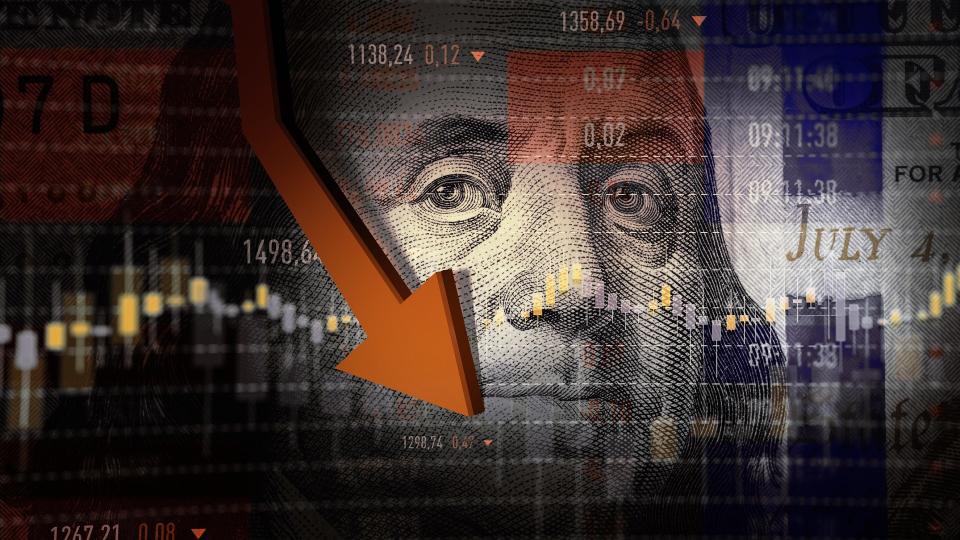Recessions Happen More Than You Think: Here’s What To Know

Recessions may seem like rare instances that only happen in times of severe economic turmoil, but the reality is that they happen more often than you might think. According to the New York Times, the U.S. has actually been in a recession 14% of the time since World War II. In fact, if you’re reading this, you have likely already lived through more than one recession. But with inflation hitting its highest levels in 40 years and the Fed embarking on an aggressive program to hike interest rates, some fear that the next recession is right around the corner.
Look: Unplug These Appliances That Hike Up Your Electricity Bill
Read More: 3 Easy Tips To Turn Your Credit Woes Into Wows
Whether or not that comes true, here are the most important things you should know about recessions in general, including how they work and what to expect.
What Exactly Is a Recession?
When it comes to recessions, there are traditional definitions and “real-world” examples. Traditionally speaking, a recession occurs when the nation’s Gross Domestic Product contracts for at least two consecutive quarters. But in the U.S. there is an official arbiter of when a recession has occurred, and that authority is the Business Cycle Dating Committee of the National Bureau of Economic Research, or NBER. The NBER uses a number of data points to determine when an official recession occurs, including domestic production and employment indicators. Declines in inflation-adjusted manufacturing, wholesale-retail trade sales and industrial production are also factors, in addition to prolonged declines in employment, real income and production.
What Causes Recessions?
Just like there is no such thing as a garden-variety recession, there is no one single cause of a recession. Some economists argue that recessions are inevitable events that occur regularly as a normal part of the business cycle. But typically, there are some triggering events that help push the economy into recession.
So-called “black swan” events, which are unpredictable and wreak economic havoc, are a possible cause. The rapid spread of COVID-19 is a great example of a black swan event that created a recession.
Actions of the Federal Reserve can often tip the economy into recession, as the Fed tends to raise interest rates over a prolonged period when the economy is running too hot, eventually slowing it to the point of a recession.
The popping of so-called “bubbles” in the economy can also send it into recession, such as when dot-com companies fell off a cliff during the tech wreck of the late 1990s.
Take Our Poll: Do You Think You Will Be Able To Retire at Age 65?
What To Expect During a Recession
There’s no such thing as a vanilla recession, and each one can play out in a number of different ways. However, all recessions share at least one thing in common: they all reflect economic contraction. This can appear in a number of different ways, but typical markers include rising unemployment, reduced demand for goods and services and less money in the pockets of Americans. Recessions also usually see lower home prices and falling stock market values. If you anticipate a recession is on the way, it’s a good practice to build up your emergency fund as large as possible and to lock down your employment situation as best you can.
What Ends Recessions?
Just as recessions are a normal part of the economic cycle, so too are recoveries. In fact, the average post-WWII recession lasts just 11 months. Over time, prices and economic activity drop to such low levels that demand begins to reignite. This is often fueled by low interest rates and an increase in the money supply. During the early days of the coronavirus pandemic, for example, the combination of the Fed slashing interest rates to essentially zero and the U.S. government pumping $5 trillion into the economy, including $1.8 trillion directly to individuals and families, helped end the shortest recession in modern history, at just two months according to the NBER.
Other recoveries were begun by the elimination of the exogenous shock that originally triggered the recession, or American consumers taking advantage of lower prices of everything from goods and services to homes and the stock market. But as Giacomo Santalego, Ph.D. and senior lecturer of economics at Fordham University notes, “What causes that economic turnaround? Same thing at the top: Things that are not predictable.”
Are We Headed Towards a Recession Now?
Some economists feel that a recession is inevitable in 2022 or early 2023, thanks to a number of factors. First, inflation has reached peaks not seen in 40 years, with the CPI jumping 8.6% year-over-year as of May 2022. Next, mortgage rates nearly doubled just since early 2022, and home prices have risen sharply, popping over 20% from March 2021 to March 2022 alone. Third, the Fed has already embarked on an aggressive interest-hike program to rein in skyrocketing inflation, and it’s determined to complete the job even if it does knock the economy into a recession. As achieving a so-called “soft landing” is difficult to impossible, many experts see a recession right around the corner.
More From GOBankingRates
This article originally appeared on GOBankingRates.com: Recessions Happen More Than You Think: Here’s What To Know
